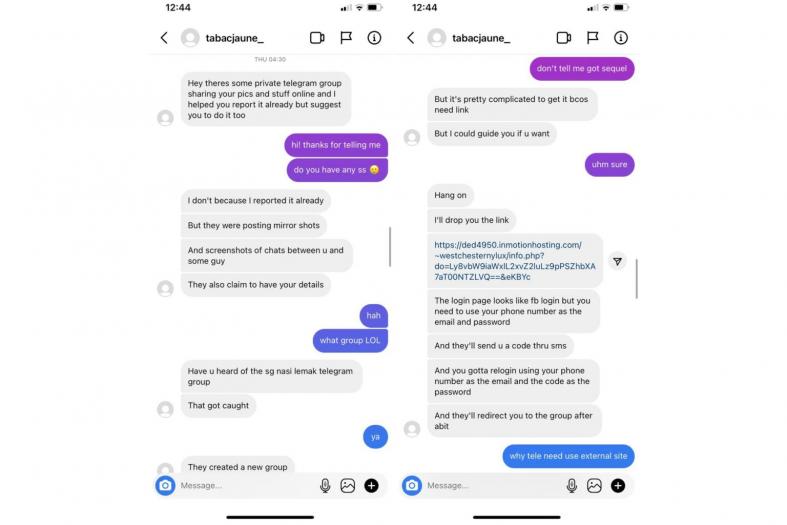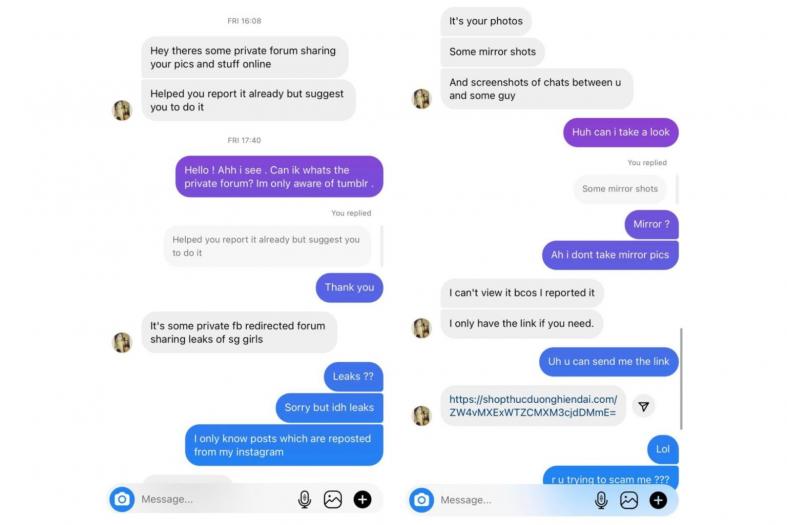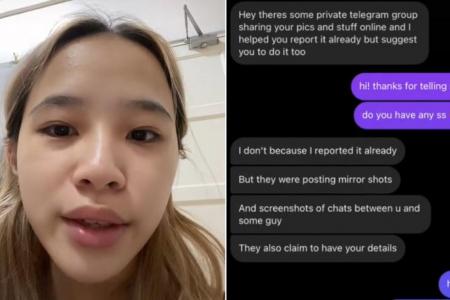Young women in Singapore targeted in 'leaked photo' scams
When she received an Instagram message telling her that her photos and personal information were being shared on a private Telegram group, Ms Glennice Tong got worried.
The Instagram user, who appeared to be a woman, warned Ms Tong that the group was a "remake" of the now-defunct Telegram group SG Nasi Lemak, where obscene photos and videos of women were shared.
The student, 22, told The Straits Times (ST) that she had not taken such images.
She said: "The thought of there being another chat group like SG Nasi Lemak, and the idea of my photos on it and possibly more girls being harmed because of it were terrifying."
The SG Nasi Lemak group on Telegram had 44,000 members at its peak.
One of its administrators was jailed and fined last year, while another man was given a mandatory treatment order. Two young people were given probation.
Ms Tong said the woman appeared friendly and claimed she had already reported the chat group on her behalf, and suggested she do the same.
Ms Tong asked for more information and was later sent a link to join the group.
Speaking to ST on Jan 27, the same day she received the messages, Ms Tong said she became suspicious when the person claimed that aside from photos, there were screenshots of chats between her and a man.
Ms Tong added: "When she sent me a sketchy link to join the group, I knew it was a scam."
The link led her to what appeared to be the Facebook login page that required her to key in her phone number and subsequently an OTP that would be sent to her number.
Ms Tong did not fill in her particulars and made a police report less than an hour later.
The police confirmed a report was lodged.

Ms Tong said: "Such scams are really scary because it is a genuine fear for many girls that their photos will get circulated. They may do anything to take them down."
Ms Tong also posted a video on TikTok warning young women to be wary of such scams.
Ms Reiane Ng, 19, experienced such scams twice over the past three months.
The polytechnic student said she received a message on Facebook in late November telling her that her private details, including her address, were being shared on a private Facebook forum page.
Ms Ng was told to key in her e-mail address and password on what appeared to be a Facebook login page.She said: "I almost wanted to give them my details, but I remembered the same thing happened to another girl who was warning her friends on Instagram not to fall for it."
Ms Ng encountered a similar scam on Jan 21 when she was told on Instagram that there was a private Facebook forum sharing leaked nude photos of Singaporean girls, including hers.
She said: "I was scared, but also suspicious as she said there were mirror photos of me being circulated even though I did not take such photos. She also said she reported the group for me, which made it seem like she was looking out for me."

When Ms Ng saw the link, she knew it was a scam as the URL included strings of random letters and symbols. Ms Ng did not make a police report, but warned her friends on social media about the messages.
Three other women also commented on social media they have received similar messages.
Dr Annabelle Chow, principal clinical psychologist at Annabelle Psychology, said such scams are elaborately designed to induce victims' sense of urgency to respond.
She said: "Scammers are getting more creative. They are preying on the women's fears their photos will spread across different platforms."
Dr Chow added that when scammers say they have reported the chat group, this triggers a positive response from the victim, who will be likely to trust them.
She said: "There is a lot of emotional manipulation at play."
Mr Yeo Siang Tiong, general manager for South-east Asia at cyber-security firm Kaspersky, said such scams are likely to be a complex case of phishing.
Mr Yeo said cyber criminals hope to instil panic and fear to trick people into providing confidential information by pressuring them to reply quickly or issuing ultimatums.
He advised users to resist the pressure to act immediately in such situations.
Mr Yeo said: "Even if a message comes from someone you know, remember their accounts can also be hacked. Always treat links and attachments with great care."
In an advisory issued online, the police said users should never input sensitive information to pop-up windows from e-mails or websites and never download or open attachments in e-mails from unfamiliar sources.
Users should also never feel pressured to reveal any personal information online.
Those with information related to such crimes can call the police hotline on 1800-255-0000, or submit it online on the iWitness website.
The public can also visit the Scam Alert website or call the Anti-Scam Hotline on 1800-722-6688.
Get The New Paper on your phone with the free TNP app. Download from the Apple App Store or Google Play Store now


